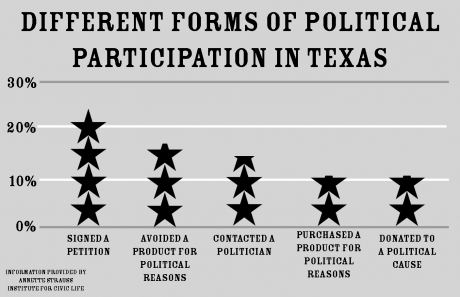Texans do not like to talk about politics. The Annette Strauss Institute for Civic Life recently published the 2018 Texas Civic Health Index, which used the U.S. Census Bureau’s Current Population Survey (CPS) to compile a report on the state of civic life in Texas. It indicates that Texans appear to be apathetic about discussing politics: “When asked how frequently they talk about politics with friends and family, only 23 percent say they do so often — ranking the state 50th in the nation.”
As a Texas Civic Ambassador, I track how this trend of depressed participation manifests on Trinity’s campus, and use my platform to extend a conversation around the very subjects Texans love to avoid: civic participation and politics. My hope is that this column will serve as a guide for navigating the emerging civic dialogue on campus.
‘Civic life’ has a wide variety of significances depending on who you ask, but it generally refers to community participation. As outlined by the 2018 Texas Civic Health Index, some common indicators of civic life include donating, neighborhood connectedness, volunteering, voter registration and turnout — i.e. political participation — and other forms of political contact.

Essentially, if you register to vote, vote regularly in elections, contact and work with your political representatives, or participate in community initiatives that require dialogue, cooperation and trust — you are a civically engaged citizen.
There are many ways to be civically active, and there is no ‘best’ way to be involved in your community. Still, all of them — voting, volunteering with a community group and political organizing — all require some level of money, time, knowledge and emotional commitment. It is a privilege to be a civically engaged citizen in Texas.
While participating in your community as a student can be difficult, active involvement on our campus and an awareness of civic life are vitally important. Trinity students are poised to change the landscape of our political community by acting on our civic and political convictions.
The data available in the 2018 Texas Civic Health Index illustrates that those with higher incomes and advanced degrees are more likely to discuss politics. Trinity University students are receiving an advanced education and are on the path toward long-term socioeconomic success, thus we must simultaneously recognize our potential marginalization from civic dialogue as young people, our privilege as students who attend a private four-year university with a wealth of resources, and our power to change the course of civic life and politics in Texas.
The data hints that we may be the next generation of change-makers for our state. While low voter registration, turnout and civic participation are detrimental overall, the depressed state of civic life also means students have a window of opportunity to alter the civic health of our communities positively — because Trinity students have the skills and access needed to become involved and motivate others.
Further, we as students can chose to have informed conversations, broaden our field participation and listen to the diverse array of organizers and political activists that are working in and around the Trinity community.
The following two articles in this series will explore why civic participation is so crucial, the emerging vibrant civic life on campus and will include some opportunities for student involvement. For now, I want to close with a note on data interpretation.
This series relies heavily on data from the 2018 Civic Health Index to give readers a picture of the overall poor civic health of Texas, and often displays the correlation of civic participation and higher education and income. This correlation is not intended to imply that the wealthy and more educated among us possess, or indeed should possess, a monopoly on civic participation.
While socioeconomic privileges make navigating our structures of citizenship easier, the healthy civic life of Texas inherently depends on community participation and should transcend socioeconomic barriers. Everyone, including Trinity students, should be talking politics.
Chiara Pride is a sophomore and a Texas Civic Ambassador for UT-Austin’s Annette Strauss Institute for Civic Life. More information about the Annette Strauss Institute and their programs can be found on their website.






